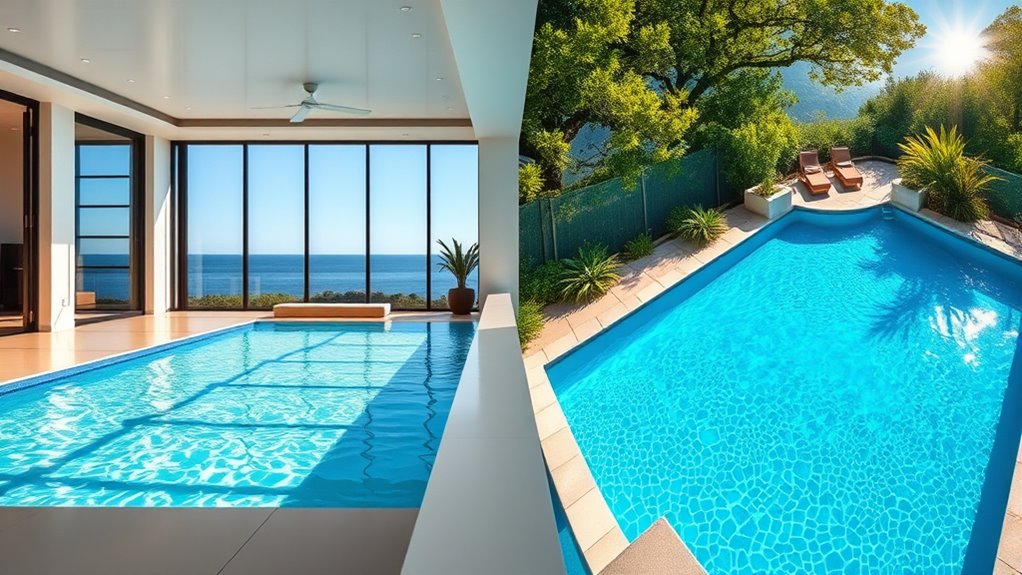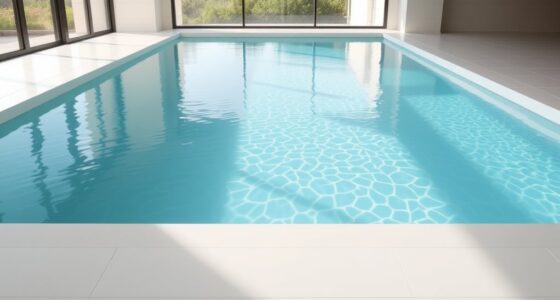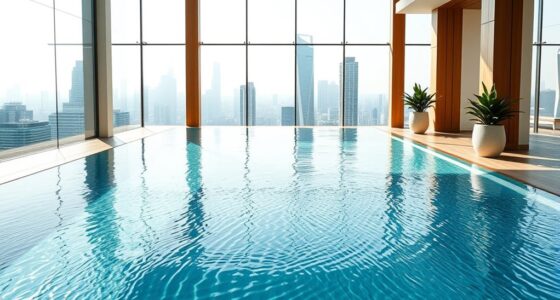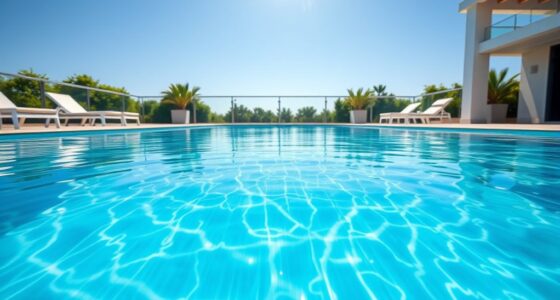Choosing between indoor and outdoor endless pools depends on your priorities for climate control, privacy, maintenance, and how well the pool integrates with your space. Indoor pools offer year-round use, better climate management, and more privacy, but can be pricier and require more space inside. Outdoor pools are easier to install and less costly upfront but need more maintenance and can be affected by weather. To make the best choice for your lifestyle, explore the details ahead.
Key Takeaways
- Indoor pools provide year-round use with climate and noise control, while outdoor pools are affected by weather and external noise.
- Indoor pools require more initial investment but offer better privacy and reduced debris; outdoor pools are generally cheaper upfront.
- Outdoor pools enhance landscape aesthetics and space flexibility but need more maintenance from weather and debris.
- Indoor pools offer consistent conditions, safety, and convenience regardless of weather, unlike outdoor pools which depend on outdoor environment.
- Your choice depends on space, budget, privacy needs, maintenance preferences, and climate considerations.
Environmental Control and Climate Considerations
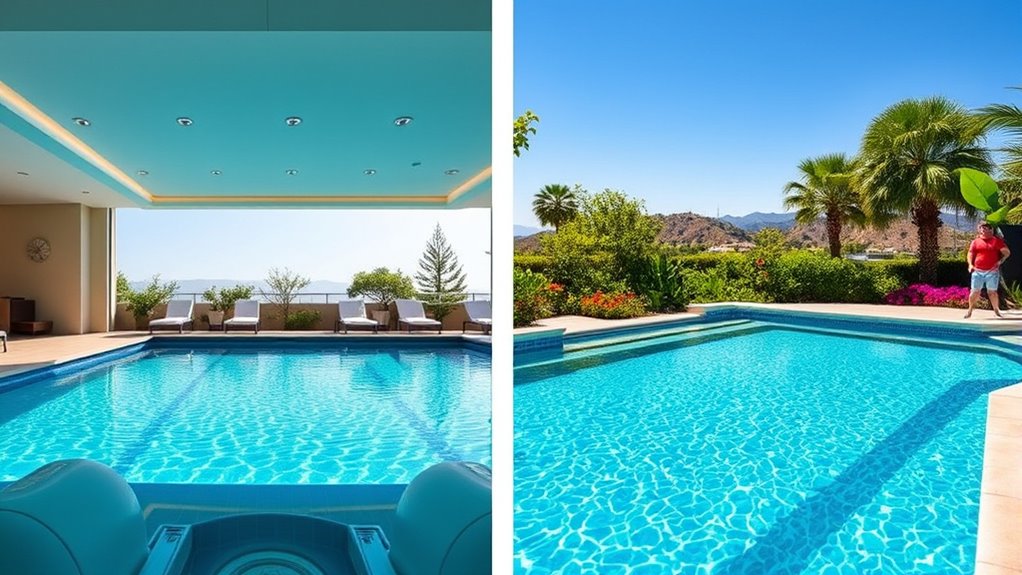
Indoor pools offer precise control over environmental conditions, allowing you to set and maintain the ideal temperature and humidity levels year-round. This means you won’t have to worry about outdoor weather changes affecting your swimming experience. You can keep the water comfortably warm, regardless of the season, and prevent drafts or cold air from disrupting your swim. Humidity levels are also manageable, reducing the risk of mold or mildew buildup. With climate control systems, you can create a consistent environment that’s always ready for use. This stability ensures your pool remains inviting and safe, no matter outside weather patterns. Additionally, indoor pools can be equipped with good lighting, enhancing visibility and safety during your swim. Overall, indoor pools give you the flexibility to enjoy swimming without interruptions from rain, wind, or extreme temperatures.
Space Requirements and Location Flexibility

While climate control guarantees a comfortable swim regardless of weather, your choice of pool location also depends heavily on space availability and flexibility. Indoor pools require a dedicated room or area with sufficient ceiling height, often limiting placement options in smaller homes. Outdoor pools, on the other hand, demand enough yard space and may influence your landscape design. Consider these factors:
- Available indoor square footage
- Yard size and layout
- Structural modifications needed
- Local zoning or building codes
- Future expansion or relocation possibilities
Your decision hinges on balancing your spatial constraints with your desired pool placement. An indoor pool offers more control over surroundings, but needs a significant space commitment. Outdoor pools provide flexibility in placement but depend on your outdoor environment’s size and layout. Additionally, the presence of mold or spoilage signs in nearby materials can impact the suitability of outdoor versus indoor environments.
Maintenance and Cleaning Needs
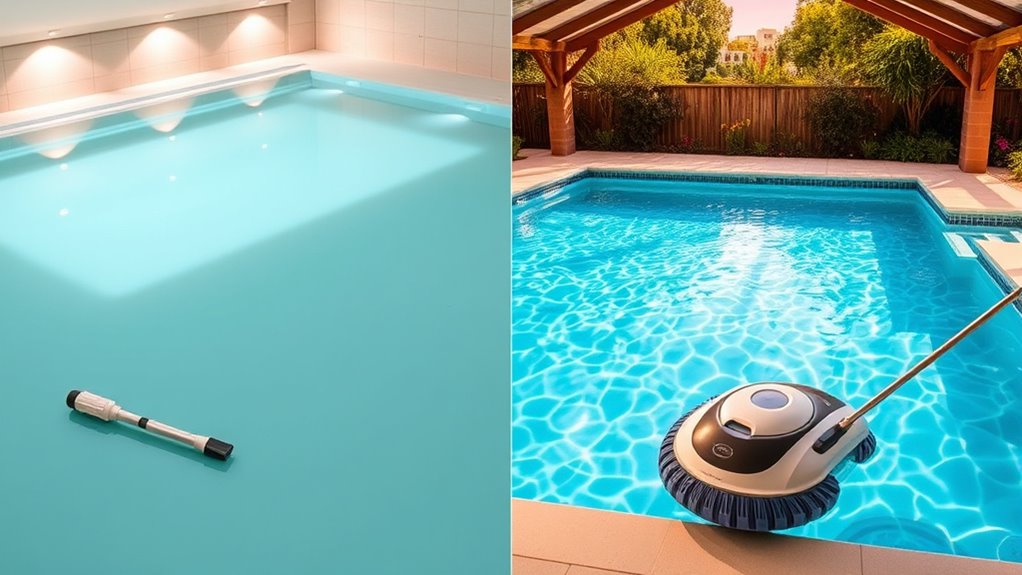
Indoor pools benefit from stable environmental control, reducing the need for frequent cleaning due to fewer debris and weather impacts. Outdoor pools, however, require regular debris management and more frequent cleaning because of leaves, dirt, and rain. Understanding these differences helps you plan your maintenance routine more effectively. Additionally, color accuracy in pool lighting and design can enhance the overall aesthetic and ambiance of your swimming area.
Indoor Environmental Control
Maintaining a controlled environment is vital for keeping an Endless Pool in top condition, especially when installed indoors. You need to regulate temperature, humidity, and air quality to prevent mold, corrosion, and equipment damage. Proper ventilation is essential to reduce moisture buildup and ensure fresh air circulation. Using dehumidifiers and air purifiers helps maintain ideal conditions, while regular temperature checks prevent stress on the system. Additionally, controlling dust and airborne particles minimizes debris settling in the water and on surfaces. Consider these factors:
- Consistent humidity levels to prevent mold growth
- Adequate ventilation to reduce moisture buildup
- Regular air quality monitoring
- Proper heating to avoid temperature fluctuations
- Maintaining a dust-free environment to reduce debris
Outdoor Debris Management
Outdoor pools are more exposed to natural debris like leaves, dirt, and insects, making regular cleaning essential to keep the water clear and equipment functioning properly. You’ll need to remove fallen leaves, insects, and dirt frequently to prevent clogging filters and ensure water quality. Using a skimmer net daily can help keep the surface clean.
| Debris Type | Management Tip |
|---|---|
| Leaves | Rake off with skimmer net daily |
| Dirt & Dust | Use a pool vacuum weekly |
| Insects | Skim surface regularly |
| Twigs & Small Branches | Clear promptly to prevent clogging |
Consistent debris removal maintains clarity, prevents damage, and keeps your outdoor pool inviting and safe.
Routine Cleaning Frequency
To keep your pool water clear and equipment functioning properly, establishing a regular cleaning schedule is essential. Indoor pools typically require less frequent cleaning since dust and debris are less prevalent, but you should still vacuum the floor weekly and wipe down surfaces monthly. Outdoor pools face more dirt, leaves, and insects, so cleaning needs are more frequent—ideally, several times a week. Regular maintenance includes skimming debris, brushing the walls, checking chemical levels, and cleaning filters. Additionally, using eye patches can help reduce puffiness and dark circles around your eyes after long cleaning sessions or pool visits.
Cost Implications and Budget Planning
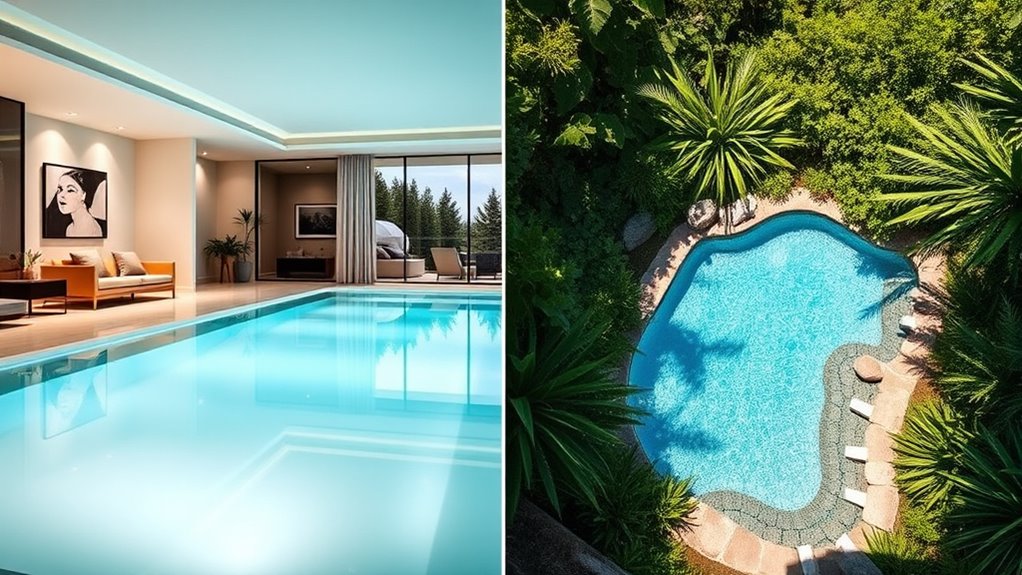
When considering an endless pool, understanding the cost implications is essential for effective budget planning. Indoor pools generally have higher upfront costs due to installation, space modifications, and climate control needs. You’ll also face ongoing expenses like heating, lighting, ventilation, and maintenance. Outdoor pools usually cost less initially but may incur additional costs over time, such as weatherproofing, cover maintenance, and seasonal adjustments. Keep in mind that indoor pools might increase your energy bills due to heating and humidity control, while outdoor pools could require frequent repairs from weather damage. To stay within budget, compare upfront costs with long-term expenses. Consider your usage frequency, energy efficiency options, and maintenance needs to make an informed decision that aligns with your financial situation. Additionally, exploring cost-effective solutions can help optimize your investment and reduce ongoing expenses.
Privacy and Noise Levels
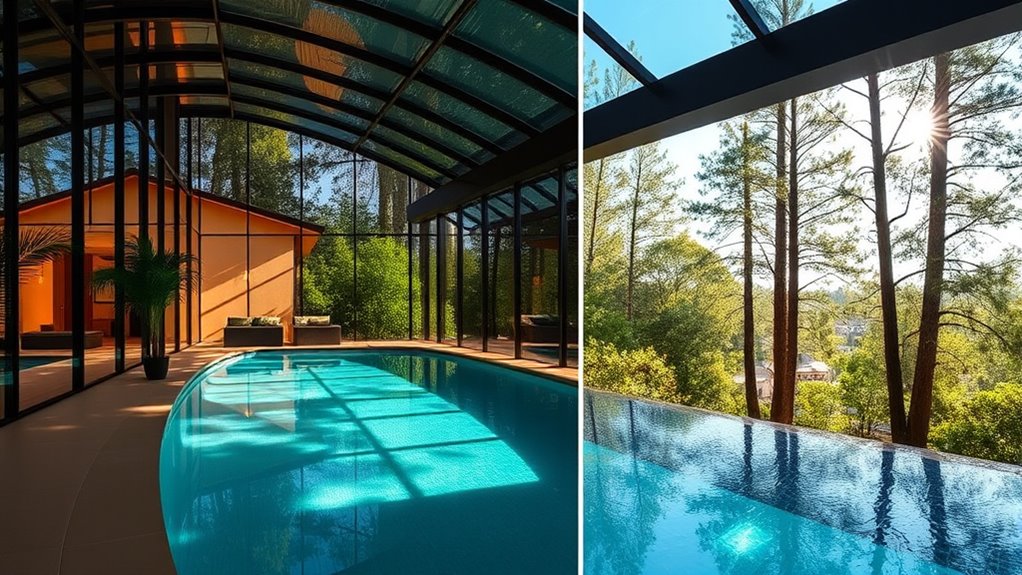
You might notice that outdoor pools are more exposed to environmental noise, which can be distracting during your swim. Privacy concerns also come into play, especially if your backyard is visible to neighbors or passersby. Indoor pools offer a quieter, more secluded experience, but they can still be affected by household noise or nearby activities. Additionally, fetal movements can be more noticeable in a private setting, enhancing your overall comfort during swim time.
Noise Distraction Factors
Privacy and noise levels can substantially influence your swimming experience, whether indoors or outdoors. External sounds, such as traffic or neighbors, can disrupt relaxation outdoors, while indoor pools may be affected by household noise. Noise distractions can diminish your focus and enjoyment, especially during early mornings or late evenings. Factors to consider include:
- Ambient outdoor noise from traffic, animals, or neighbors
- Indoor household sounds like TV, appliances, or conversations
- Wind or weather conditions causing external noise
- Echoes or reverberations indoors affecting sound clarity
- Nearby construction or maintenance activities
- The effectiveness of air purifiers in reducing airborne pollutants, which can also help minimize odors and improve overall comfort in enclosed indoor spaces.
These distractions can interfere with your concentration, making it harder to relax or swim effectively. Recognizing the potential noise factors helps you choose a location that aligns with your comfort and serenity during swim sessions.
Privacy Concerns Heightened
Privacy concerns often become more pronounced with outdoor pools, as they are more susceptible to prying eyes and unexpected onlookers. When you choose an outdoor endless pool, you might face constant surveillance from neighbors, passersby, or nearby properties, making relaxation difficult. You could consider privacy solutions, but these often involve additional costs or aesthetic compromises. To understand the implications better, consider this table:
| Privacy Level | Noise Control | Visual Seclusion |
|---|---|---|
| High | Moderate | Complete |
| Moderate | Good | Partial |
| Low | Poor | Minimal |
| Varies | Varies | Varies |
| Factors | Surroundings | Landscaping |
Evaluating these aspects helps you decide whether outdoor exposure aligns with your privacy expectations. Additionally, understanding cybersecurity considerations can help protect your privacy in connected outdoor pools with smart features.
Environmental Noise Influence
Environmental noise markedly impacts the level of privacy and tranquility around outdoor pools. Noise from nearby traffic, neighbors, or recreational areas can disrupt your swimming experience and reduce privacy. Outdoor pools are more exposed to ambient sounds, which can be distracting or intrusive. To mitigate this, consider strategic placement and sound barriers. Factors influencing noise levels include:
- Proximity to busy streets or urban centers
- Presence of natural windbreaks like trees or fences
- Nearby entertainment or social venues
- Time of day and seasonal noise fluctuations
- Use of outdoor soundproofing solutions
- Incorporating portable sound barriers can significantly help in reducing unwanted noise and enhancing privacy.
Understanding these elements helps you decide whether an outdoor pool suits your desired privacy and serenity. Managing noise is vital to creating an environment where you can relax without disturbances.
Accessibility and Convenience

Indoor pools typically offer greater accessibility and convenience since you can use them year-round without worrying about weather conditions. You don’t need to plan around rain, snow, or extreme temperatures, making spontaneous swims easier. With an indoor setup, you can maintain consistent schedules, fitting workouts or relaxation into your day without delay. Plus, indoor pools often come with features like built-in heaters, lighting, and easy access points that enhance usability. You won’t have to worry about outdoor debris, leaves, or insects contaminating the water, saving you time on cleaning. If you have limited outdoor space or live in a climate with harsh weather, an indoor pool provides reliable, hassle-free access whenever you want to swim. This convenience makes it easier to stick to your fitness or relaxation routine. Additionally, indoor pools can promote senior safety by reducing slip hazards related to outdoor weather conditions.]
Aesthetic Integration With Your Home or Yard
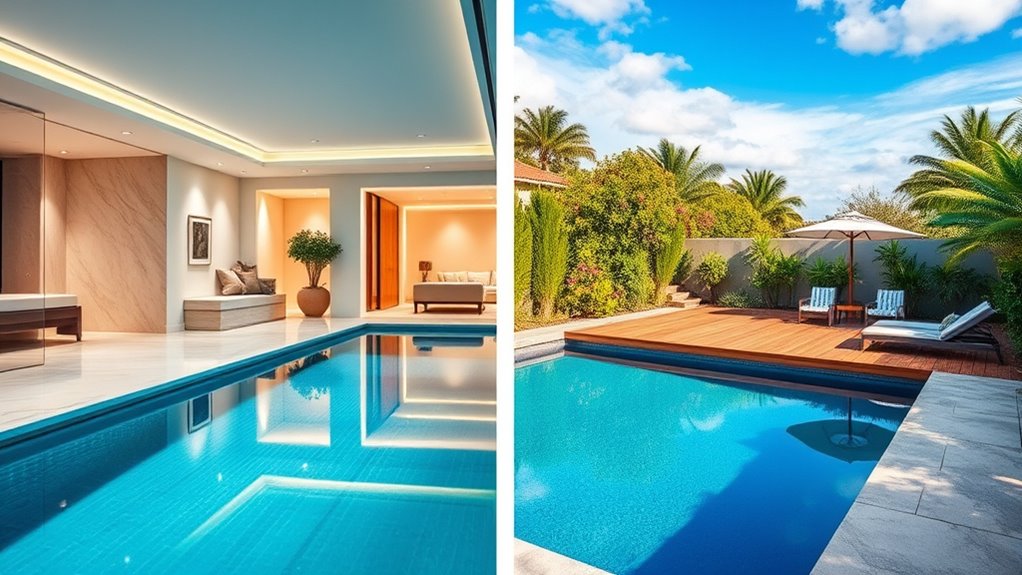
Integrating an endless pool into your home or yard can profoundly enhance your property’s overall aesthetic. It creates a seamless blend of luxury and functionality, elevating your outdoor space or indoor environment. When designing your pool area, consider how it complements existing architecture and landscaping. Thoughtful placement and stylish features can make the pool a focal point.
To achieve a polished look, you might incorporate:
- Custom tile designs that match your home’s style
- Surrounding natural stone or decking materials
- Elegant lighting to highlight the pool at night
- Discreet fencing or privacy screens
- Harmonious landscaping that blends with the pool’s design
These elements help your pool become an integrated part of your property’s visual appeal.
Safety and Security Factors
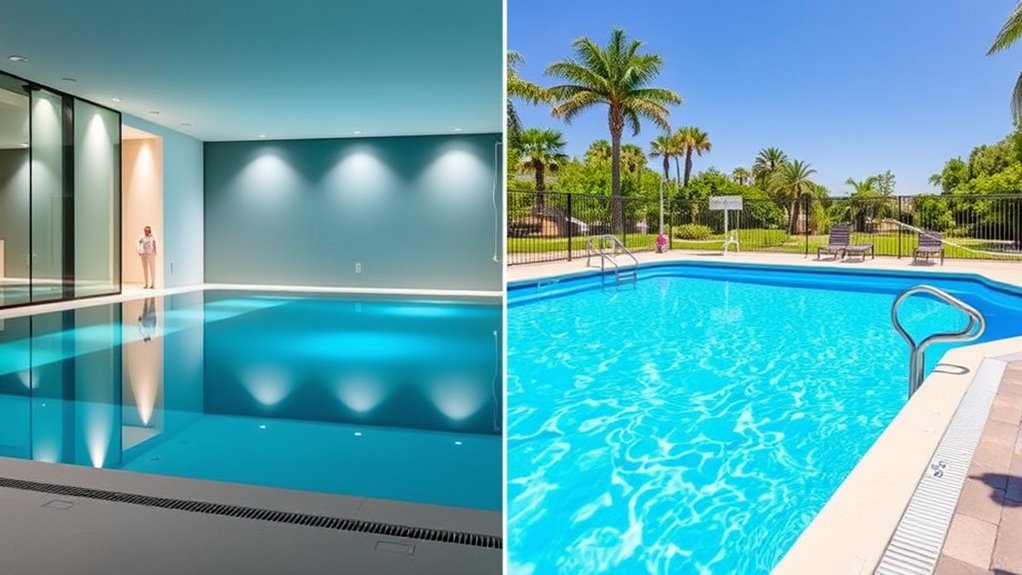
Safety and security are vital when choosing between indoor and outdoor pools. You need to contemplate environmental hazards like weather or debris, as well as how you’ll supervise and monitor pool use. Addressing these factors helps guarantee a safe and enjoyable swimming experience.
Environmental Hazards
Have you considered the environmental hazards that come with setting up an endless pool outdoors? Exposure to weather conditions can damage equipment or cause accidents. Debris like leaves or dirt can contaminate the water, increasing maintenance and health risks. Ultraviolet rays may degrade pool materials over time, reducing lifespan. Pests or animals might enter the pool area, posing safety concerns. Additionally, outdoor pools are more vulnerable to theft or vandalism.
- Damage from storms or heavy rain
- Contamination from dirt, leaves, or pests
- UV degradation of pool components
- Increased risk of vandalism or theft
- Slippery surfaces due to weather conditions
Considering these hazards helps you make an informed decision about outdoor installation, ensuring safety and longevity.
2. Supervision and Monitoring
Because endless pools can pose safety risks if not properly monitored, supervising their use is vital, especially outdoors where additional security concerns arise. You should always keep an eye on swimmers, especially children or inexperienced users, to prevent accidents. Installing safety features like alarms, cover locks, and fencing can help deter unsupervised access. Regularly monitoring pool activity ensures that any issues, such as slips or equipment malfunctions, are caught early. When outdoors, lighting is essential for visibility during evening use. Consider using security cameras or remote monitoring systems for added peace of mind. Remember, proactive supervision and monitoring not only protect users but also help you maintain a safe and secure environment around your endless pool.
Longevity and Durability in Different Settings

Indoor and outdoor Endless Pools differ markedly in their longevity and durability, primarily due to environmental factors. Indoor pools are protected from weather, reducing exposure to UV rays, temperature fluctuations, and debris, which helps preserve equipment and surfaces. Outdoor pools face harsher conditions that accelerate wear and tear, requiring more frequent maintenance. Factors influencing durability include:
- UV exposure causing fading and material degradation
- Temperature swings leading to expansion and contraction
- Debris accumulation increasing cleaning needs
- Humidity promoting mold and corrosion
- Weather-related impacts like storms and freezing temperatures
Choosing an indoor pool offers increased longevity with less maintenance effort, while outdoor pools demand tougher materials and more upkeep to withstand the elements. Your environment directly influences how long your pool stays in top condition.
Customization Options and Future Proofing
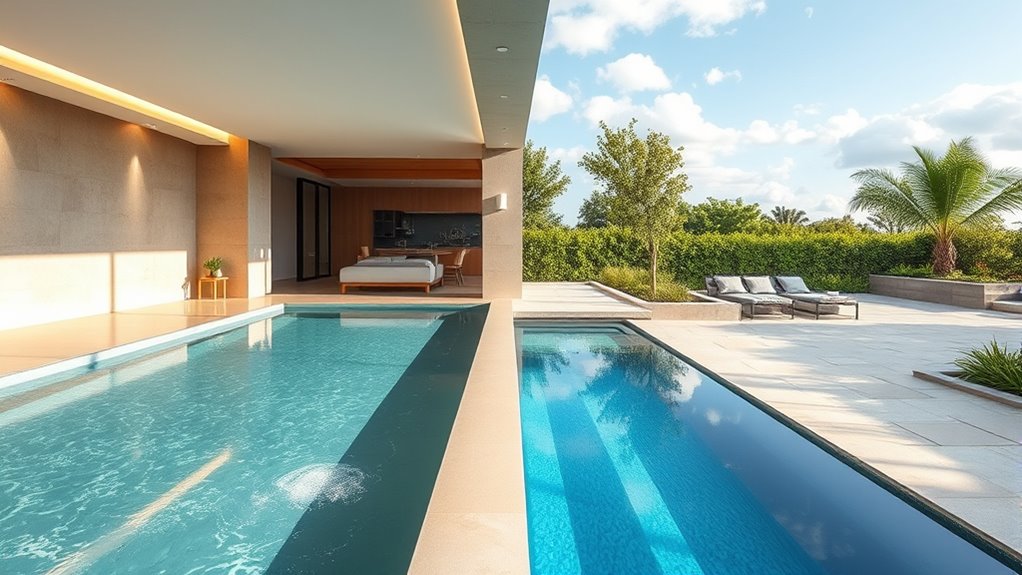
When selecting an Endless Pool, customization options and future-proofing play a crucial role in ensuring your investment remains functional and relevant over time. You want features that can adapt to your changing needs and technological advances. Many pools offer options like adjustable jets, smart controls, and lighting upgrades. To help visualize, here’s a comparison:
| Feature | Indoor Pools | Outdoor Pools | Future Proofing |
|---|---|---|---|
| Customizable Jets | Yes, with multiple settings | Yes, limited options | High, expand with new tech |
| Control Systems | Smart app integration | Basic controls | Upgradable firmware |
| Lighting Options | RGB lighting, mood settings | Standard lighting | Compatibility with new tech |
| Add-on Accessories | Swim tether, resistance bands | Resistance training accessories | Modular design for future upgrades |
| Material Choices | Custom finishes, tiles | Limited options | Durable, adaptable materials |
Frequently Asked Questions
Which Type of Pool Is Better for Year-Round Use?
Indoor pools are better for year-round use because they provide a controlled environment, protecting you from weather extremes and outdoor debris. With indoor pools, you can enjoy consistent water temperature, avoid seasonal closures, and schedule swims whenever you want without concern for weather conditions. Plus, they require less maintenance due to reduced exposure to outdoor elements, making them a more convenient and reliable option for year-round swimming.
How Does Climate Affect Outdoor Pool Maintenance?
Climate greatly impacts outdoor pool maintenance. Hot, sunny weather accelerates algae growth, requiring more chlorine and frequent cleaning. Cold temperatures can cause freezing, leading to potential damage if not properly winterized. Heavy rain washes debris into your pool, demanding regular skimming and filtration. Wind stirs up dirt and leaves, increasing filtration needs. Humid conditions promote mold and bacteria, so you must stay vigilant with chemical balance and cleaning routines to keep your pool safe and inviting.
Can Indoor Pools Be Installed in Small Homes?
Yes, indoor pools can be installed in small homes. You’ll need to take into account available space, ceiling height, and proper ventilation to prevent humidity issues. Opt for compact or custom-designed pools to fit your layout and make certain there is adequate clearance around the pool for maintenance and safety. With careful planning and professional installation, you can enjoy the benefits of an indoor pool without requiring a large home.
Are Outdoor Pools More Energy-Efficient Than Indoor Pools?
Outdoor pools are generally more energy-efficient because they don’t require heating or climate control, unlike indoor pools that need consistent temperature regulation and ventilation. You might find that outdoor pools lose less heat and require less energy to maintain water temperature. However, factors like insulation, pool size, and local climate can influence energy use. Consider these aspects to determine which option aligns better with your energy-saving goals.
What Are the Best Options for Indoor Pool Ventilation Systems?
Ever wondered how to keep your indoor pool fresh and healthy? You should opt for a high-quality ventilation system like an energy-efficient heat recovery ventilator (HRV) or energy recovery ventilator (ERV). These systems effectively exchange indoor air, control humidity, and reduce odors, all while saving energy. Proper ventilation prevents mold and maintains air quality, making your swimming environment safer and more comfortable. Don’t overlook the importance of a well-designed ventilation setup!
Conclusion
Whether you opt for an indoor or outdoor endless pool, imagine yourself stepping into a serene oasis—warm water gliding around you, sunlight filtering through nearby trees or soft indoor lighting. Both choices offer unique benefits that blend seamlessly into your lifestyle, like finding the perfect corner of your backyard or creating a cozy indoor retreat. Whichever you choose, your endless pool becomes a personal sanctuary, turning everyday relaxation into a beautiful, inevitable part of your life.

